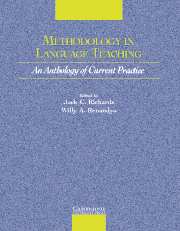Book contents
- Frontmatter
- Contents
- Acknowledgments
- Introduction
- Section I Approaches to Teaching
- Section 2 Lesson Planning and Classroom Management
- Section 3 Classroom Dynamics
- Section 4 Syllabus Design and Instructional Materials
- Section 5 Task and Project Work
- Section 6 Learning Strategies
- Section 7 Teaching Grammar
- Chapter 13 Seven Bad Reasons for Teaching Grammar – and Two Good Ones
- Chapter 14 Addressing the Grammar Gap in Task Work
- Chapter 15 Grammar Teaching – Practice or Consciousness-Raising?
- Section 8 Teaching Pronunciation
- Section 9 Teaching Speaking
- Section 10 Teaching Listening
- Section 11 Teaching Vocabulary
- Section 12 Teaching Reading
- Section 13 Teaching Writing
- Section 14 Assessment
- Section 15 Technologies in the Classroom
- Section 16 Professional Development
- Credits
- Author Index
- Subject Index
- References
Chapter 13 - Seven Bad Reasons for Teaching Grammar – and Two Good Ones
Published online by Cambridge University Press: 10 November 2010
- Frontmatter
- Contents
- Acknowledgments
- Introduction
- Section I Approaches to Teaching
- Section 2 Lesson Planning and Classroom Management
- Section 3 Classroom Dynamics
- Section 4 Syllabus Design and Instructional Materials
- Section 5 Task and Project Work
- Section 6 Learning Strategies
- Section 7 Teaching Grammar
- Chapter 13 Seven Bad Reasons for Teaching Grammar – and Two Good Ones
- Chapter 14 Addressing the Grammar Gap in Task Work
- Chapter 15 Grammar Teaching – Practice or Consciousness-Raising?
- Section 8 Teaching Pronunciation
- Section 9 Teaching Speaking
- Section 10 Teaching Listening
- Section 11 Teaching Vocabulary
- Section 12 Teaching Reading
- Section 13 Teaching Writing
- Section 14 Assessment
- Section 15 Technologies in the Classroom
- Section 16 Professional Development
- Credits
- Author Index
- Subject Index
- References
Summary
Grammar is important, but most of the time, in most parts of the world, people probably teach too much of it. I think we can identify at least seven reasons for this.
SEVEN BAD REASONS
BECAUSE IT'S THERE
Asked why he tried to climb Everest, George Mallory famously replied, ‘because it is there’. Some teachers take this attitude to the mountain of grammar in their books: It's there, so it has to be climbed. But the grammar points in the course book may not all be equally important for a particular class.
The book may have been written for students with different purposes, studying in a different environment, perhaps with different native languages and different problems. It may have been designed for learners with more time to spend on grammar than they do today. The book may simply have been written by a grammar fanatic. It is important to choose grammar points relevant to students' needs, rather than blindly going through the syllabus from left to right.
In a well-known experiment (Hughes % Lascaratou, 1982), mistakes made by Greek secondary school children were shown to Greek teachers of English, British teachers of English, and British nonteachers. Members of each group graded the mistakes on a scale from 1 (least serious) to 5. Before you read on, you might like to give your own assessment of the seriousness of the mistakes in the sentences in the box and compare your mark with the average gradings given by the Greek teachers (GT) and the British nonteachers (BN).
- Type
- Chapter
- Information
- Methodology in Language TeachingAn Anthology of Current Practice, pp. 148 - 152Publisher: Cambridge University PressPrint publication year: 2002
References
- 5
- Cited by



